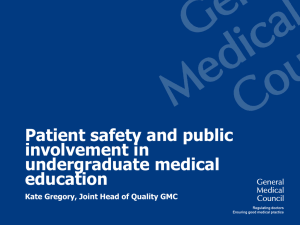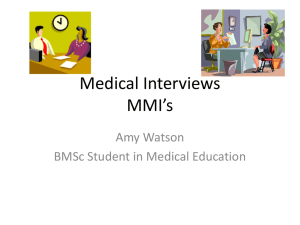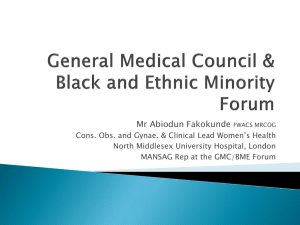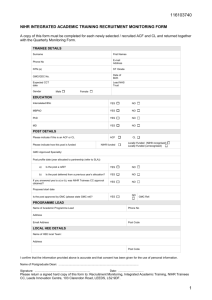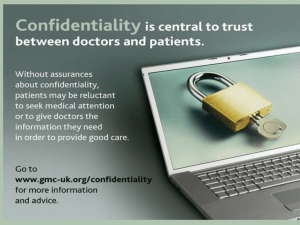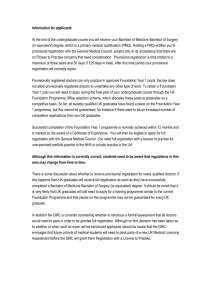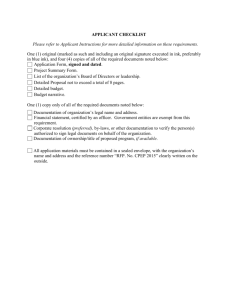Minutes of the Meeting on 31 March 2009
advertisement
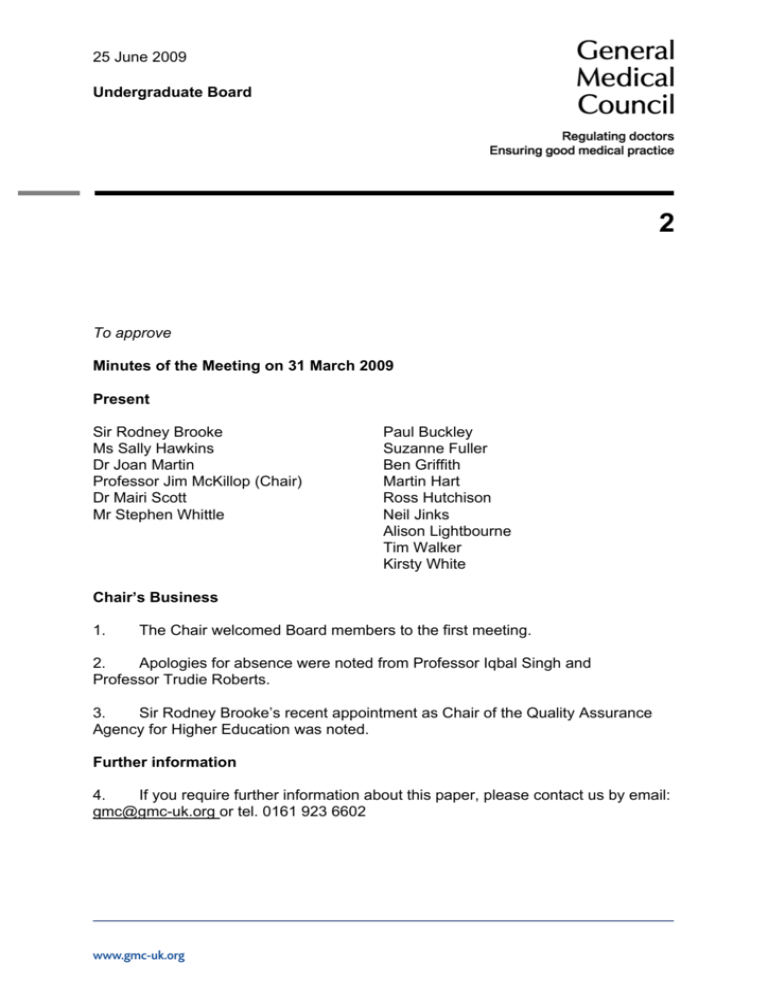
25 June 2009 Undergraduate Board 2 To approve Minutes of the Meeting on 31 March 2009 Present Sir Rodney Brooke Ms Sally Hawkins Dr Joan Martin Professor Jim McKillop (Chair) Dr Mairi Scott Mr Stephen Whittle Paul Buckley Suzanne Fuller Ben Griffith Martin Hart Ross Hutchison Neil Jinks Alison Lightbourne Tim Walker Kirsty White Chair’s Business 1. The Chair welcomed Board members to the first meeting. 2. Apologies for absence were noted from Professor Iqbal Singh and Professor Trudie Roberts. 3. Sir Rodney Brooke’s recent appointment as Chair of the Quality Assurance Agency for Higher Education was noted. Further information 4. If you require further information about this paper, please contact us by email: gmc@gmc-uk.org or tel. 0161 923 6602 Presentation: the Work of the Undergraduate Board in Context 5. The Board received a presentation on the work of the Undergraduate Board in the context of the GMC’s four statutory functions, the 2009 Business Plan and the Education and Revalidation Directorate’s operational plan. 6. During discussion on the application of the GMC’s four statutory functions to the Board’s work, the Board noted that: a. The review of Tomorrow’s Doctors is seeking to ensure that the revised guidance is mapped against Good Medical Practice. As other guidance on standards and ethics is developed, the implications for medical students will need to be considered. b. The GMC and the Medical Schools Council had recently published new guidance on student fitness to practise, which now includes guidance on health issues. The Council for Healthcare Regulatory Excellence is keen for all healthcare regulatory bodies to develop such guidance. 7. that: During discussion on Key Aim 1 of the 2009 Business Plan, the Board noted a. The QABME cycle, which had begun in 2004, completes in 2009 and all UK medical schools will have been quality assured by the end of the cycle. A more intensive process had been applied at Swansea Medical School (which is developing a curriculum to stand alone from Cardiff Medical School, where their students spend their final years) and Keele Medical School (which is developing a new curriculum). b. The review of Tomorrow’s Doctors, Lord Patel’s review and the merger of PMETB with the GMC provide an opportunity to reflect on how best to develop QABME beyond 2009. c. The Board would need to be kept informed of the development, and quality assurance, of UK medical education delivered abroad. 8. During discussion on the operational plan, the Board noted the research project to explore the relationship between placement providers and medical schools. The Research Reference Group would develop the GMC’s future research agenda. However, the Education Team would engage in the process to identify areas for future projects. International best practice in assessing professionalism, rather than competence alone, will be a future issue to consider, and recommendations might flow from Lord Patel’s review. 2 9. The Board discussed outstanding issues highlighted in the presentation. Student registration 10. The Board noted that the Chief Medical Officer (England)’s report, Good Doctors, Safer Patients (2006) and the White Paper, Trust, Assurance and Safety – the Regulation of Health Professionals in the 21st Century (2007), had asked healthcare regulatory bodies to consider whether student registration was necessary and appropriate. Council had decided that the registration of medical students was neither: few medical students cause concern and medical schools can deal with concerns much more quickly than can the GMC through regulatory proceedings. Delays through regulatory proceedings could significantly impact on medical students; and instilling in students an understanding of the purpose, importance and contribution of regulation to the development of professional values can be achieved more effectively than through student registration. Following a substantive decision from Government, student registration might have to be revisited. 11. The Board noted that some professional regulatory bodies register students and standards different from those applicable to fully registered professionals can be applied to student professionals. 12. The Board agreed that more work was required on student engagement, and in particular the need for engagement in the training environment to create a more positive picture of regulation, to promote our standards and ethics guidance more effectively among medical students, and to ensure buy-in from medical schools. 13. In the context of student fitness to practise, the Board agreed that development of the QABME process beyond 2009 should include consideration of how good practice can best be shared with medical schools, how to use QABME reports more strategically, and the approach to be taken in respect of the next cycle (for example, by adopting a risk-based approach). Bologna process 14. The Board noted that Ministers responsible for Higher Education had given reassurance that they were not pushing for the application of the process in medicine. The GMC would in due course need to reach a considered opinion of the application of the process to medical schools. The Board agreed it would be helpful to receive a more detailed update on the Bologna Process and other relevant European issues at a future meeting. 3 Undergraduate Board Statement of Purpose and External Membership 15. The Board considered and agreed its draft statement of purpose for Council’s approval, subject to amendment of paragraph four to read: ‘4. The purpose of the Undergraduate Board is to enhance the GMC’s ability to protect, promote and maintain the health and safety of the public by co-ordinating the GMC’s four regulatory functions as they apply up to the completion of the undergraduate curriculum.’ 16. The Board discussed and agreed proposals for its external membership. 17. The Board also agreed that it will be important for external members to feed not only into the GMC but also back to their sectors. If not representative, there would be no obligation on external members to fulfil the latter function. External membership of the Board will not be the only means of engagement: wider engagement will be required to capture other contributions. 18. Council’s approval for the Board’s proposed external membership would be sought on 7 May 2009 with a view to nominated external members attending the meeting on 25 June 2009. However, it is unlikely that a patient representative from the Reference Community would be recruited in time. Tomorrow’s Doctors 19. The Board received an update on progress of the review, noting that 127 completed long questionnaires, 362 short questionnaires and 99 unstructured responses had been received in response to the consultation. Responses were generally favourable, with support for enhancing experiential experience during clinical placements and for better sharing of information on poorly performing students and graduates between medical schools and the Foundation Programme. There were calls for restructuring and a more inspirational introduction. 20. 62 identical emails regarding discrimination of lesbian, gay, bisexual and transgender people had also been received. 21. The Board agreed generally that the consultation had been wide and effective. Some initial feedback indicated that the consultative event on 2 March 2009, while extremely productive, had perhaps been a little top heavy in terms of presentations and the format of the breakout groups, while maintaining focus, had not fully maximised the opportunity for wide-ranging feedback. 4 22. The Board noted the rationale for the generalist list of required practical skills. The aim of the Gateways project had been to encourage disabled people into medicine. However, this had to be balanced against the GMC’s statutory duty to protect patient safety. Doctors register as doctors rather than doctors in a particular field of medicine. All doctors therefore need to demonstrate that they are able to perform the core skills before going on to specialise. However, these may be performed in different ways with reasonable adjustments, although such adjustments may be easier to organise after full registration. 23. During discussion, the Board agreed the need to ensure that: a. The list of required practical skills was demonstrably necessary and therefore defensible (so as not to discriminate against disabled students), and fits with the competencies in the Foundation Programme curriculum. b. The revised guidance includes a focus on preparing medical students for the Foundation Programme, and on what it means to be a doctor and a professional. 24. The Board agreed: a. That members of the Undergraduate Board be closely involved in drafting the 2009 edition of Tomorrow’s Doctors. b. That the current drafting sub-group be supplemented by up to three members of the Undergraduate Board. 25. Dr Martin, Dr Scott and Mr Whittle expressed interest in joining the sub-group. Student Engagement 26. The Board discussed the programme of work to engage with medical students during 2009. 27. The Board noted a survey being piloted among medical students at five medical schools and agreed that, while an early piece of work and while feedback from students is already an important part of the QABME process, surveys could be a useful engagement tool. For example, surveying student populations in advance of QABME visits to identify issues at particular medical schools; or mass surveys as tools to select the schools for assessment. 28. The Board also agreed that QABME visits afford an opportunity to engage with medical students, noting that pre-registration events at medical schools are already used as an opportunity for engagement. Such events had been successfully used to distribute questionnaires for the Tomorrow’s Doctors consultation and would similarly be used for the consultation on draft revised guidance on end of life care. 5 29. The Board considered that some way of amending objective four should be found to reflect the duty and obligation on medical students to contribute to the profession and its work. Developing the QABME programme 2009/10 30. The Board discussed and endorsed the proposed approach to developing the QABME programme 2009/10. 31. During discussion, the Board noted the importance of continued engagement with visitors (as a resource) during the fallow year and the possibility of using visitors as part of the engagement road shows. QABME Annual Monitoring Returns 2008/09 and responses to QABME reports 2007/08 32. The Board noted the QABME Annual Monitoring Returns 2008/09 and responses to QABME reports 2007/08. 33. The Board also noted that they would receive reports on the schools currently being quality assured on 15 September 2009. Operational Report 34. The Board noted the operational report. Any other Business 35. The Board agreed that members without a background in medical education would find a workshop with medical students helpful to understand the challenges that the GMC faces in the context of undergraduate education. 6
